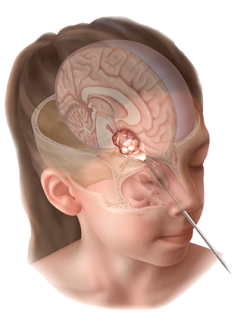The Pediatric Skull Base and Pituitary Surgery Program Weill Cornell Medicine is dedicated to providing patients with compassionate, state-of-the-science care and treatment. Pediatric neurosurgeon Dr. Jeffrey Greenfield, who directs the program, has extensive neuro-oncologic and pediatric neurosurgical training and is backed by a team of world-class experts without equal in terms of breadth of experience in treating children with tumors and lesions of the pituitary gland and anterior skull base.
Several important structures, including the pituitary gland and the optic nerves, are located within an area referred to as the anterior skull base. Diseases or conditions affecting these structures can be challenging to treat in children. Our program provides an integrated multidisciplinary approach to the comprehensive care and management of pediatric patients coping with disease processes involving these structures.
The Minimally Invasive Endoscopic Endonasal Approach The endoscopic endonasal approach to the anterior skull base provides a minimally invasive way to remove tumors that would otherwise require either a large cranial opening and brain retraction or disfiguring facial scars. Instead a small cylindrical camera called an endoscope is advanced through the nostrils, eliminating any external scars. A variety of tumors can be removed in this fashion, since the normal sinus cavities provide access to a large area at the base of the brain. Although the approach is minimally invasive, the surgery is no less aggressive in achieving a complete tumor resection compared with more traditional transcranial or transfacial approaches.
The endoscopic endonasal approach to the anterior skull base provides a minimally invasive way to remove tumors that would otherwise require either a large cranial opening and brain retraction or disfiguring facial scars. Instead a small cylindrical camera called an endoscope is advanced through the nostrils, eliminating any external scars. A variety of tumors can be removed in this fashion, since the normal sinus cavities provide access to a large area at the base of the brain. Although the approach is minimally invasive, the surgery is no less aggressive in achieving a complete tumor resection compared with more traditional transcranial or transfacial approaches.
Patients treated at Weill Cornell Medicine Neurological Surgery also benefit from other leading specialists in:
• Pediatric Neuro-oncology
• Pediatric Radiation Oncology
• Pediatric Otolaryngology
• Pediatric Endocrinology
• Pediatric Neuro-ophthalmology
• Interventional Neuroradiology